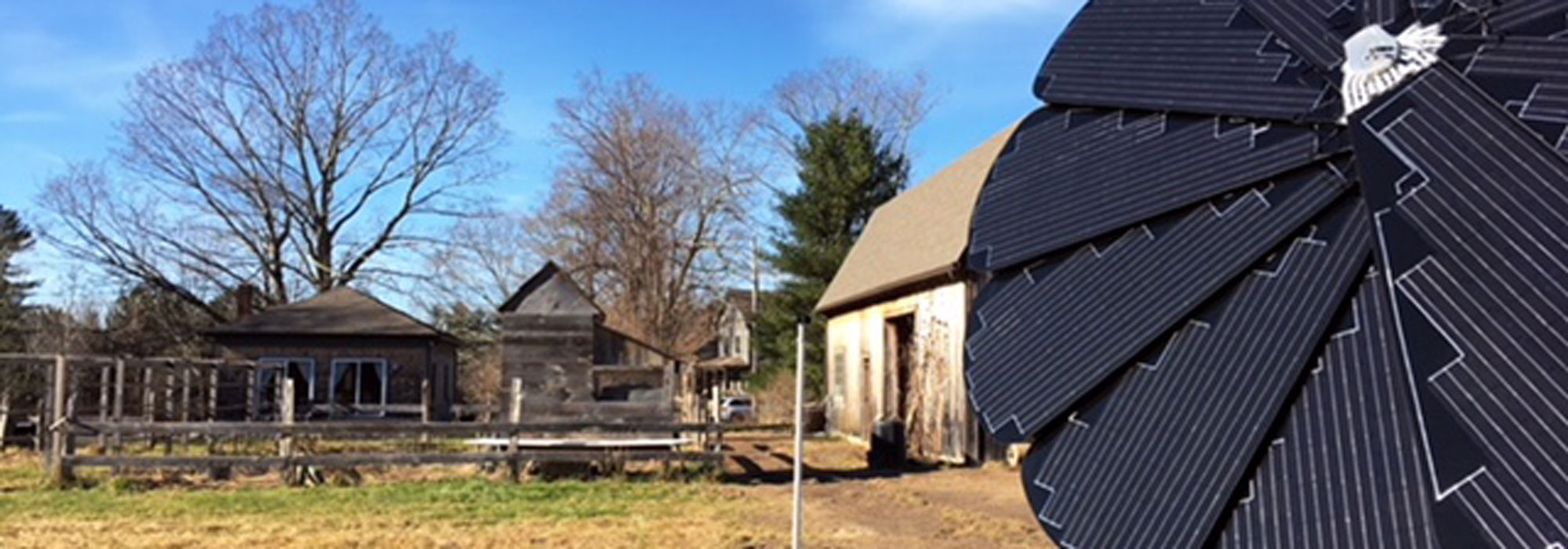Beautiful Pascoag Family Farm Welcomes SmartFlower to Rhode Island
Jan 04, 2018Rhode Islanders Scott and Beth Rabideau welcomed the first SmartFlower installation in the state at their beautiful farm in Pascoag, just before the first snowfall in New England. As longtime proponents of sustainable living, the Rabideau’ s decided to begin living completely off solar energy once their children graduated from college. To do so, they would need to find an affordable, yet high-quality solar system. The Rabideau’ s knew they had found the winning solution as soon as they came across the SmartFlower in the monthly magazine of the National Association of Home Builders. After seeing the product in person at the Rhode Island Home Show, it was a done deal.
A few weeks after the installation in Pascoag, SmartFlower Solar hosted a ribbon cutting-ceremony to commemorate the first SmartFlower in Rhode Island. This also gave us the opportunity to speak with Scott about their decision to go solar, what the SmartFlower installation process was like and how Rhode Islanders prioritize green living.

SmartFlower Solar: How did you first come to learn about the SmartFlower?
Rabideau: As a member of the RI Builders Association, I receive the National Association of Home Builders monthly magazine. There was a small article in the magazine (December 2016 issue I think) highlighting the SmartFlower. A bit of internet research followed, then my wife Beth reached out to a sales rep for additional information. We had the chance to see a unit at the Rhode Island Home Show in March of 2017 and ended up placing an order for our own in May. I joke that my SmartFlower invoice number is 009!
SmartFlower Solar: Before purchasing a SmartFlower, what knowledge did you have about renewable energy?
Rabideau: My company, Natural Resource Services, Inc. (NRS), specializes in freshwater and coastal wetland permitting in RI and MA. I have worked on permits for seven large scale solar farms to date. Each report prepared by NRS for these projects required research on the benefits of renewable energy and how the project under consideration provides such benefits. Over the last year plus, I have gained a general knowledge about solar and other renewable energy sources through my work.
SmartFlower Solar: How did your knowledge of solar influence your decision to purchase a SmartFlower?

Rabideau: Beth and I are in the early stages of being “empty nesters”. Our three to five-year plan is to downsize our living arrangement by rehabbing the 1400 square foot dwelling that we own (but don’t currently live in). We want this home to be entirely electric and powered by the renewable energy from on-site solar. Knowing that static systems have certain inefficiencies, the all in one, tracking system offered by the SmartFlower was a large part of our decision to purchase the unit. The compact nature and limited spacial requirements was also a big plus. Our current plan is to monitor this unit for a year, get a realistic handle on the generating capability of the system, then determine if we need one or two more units to support a life where all the energy we use is renewable and generated on our property. Life can be good when you’re finished paying for your children’s college tuition!
SmartFlower Solar: What SmartFlower product features do you find most engaging and why?
Rabideau: The tracking component is definitely a product feature that we found engaging. However, I would be lying if I didn’t tell you that the fact that the unit closes each night and “goes to bed” had great appeal to us. In my opinion, it is a unique element and technological achievement for a small (and affordable) residential solar system.
SmartFlower Solar: Each SmartFlower installation is specific to its self. How would you describe what the installation process was like for you?
Rabideau: My property is large and provided easy access for Mass Renewables to install the system. The process was easy, and the team at Mass Renewables was very professional. It is a construction project though, so equipment is required to dig the trench and connect the unit to the dwelling (or barn in my case). Since we installed it in November, the landscape surrounding the installation will not get cleaned up (i.e., grass growing again) until spring. The landscape would have healed more quickly if we had done the installation in the summer.
SmartFlower Solar: In your opinion, how forward thinking is the state of Rhode Island in terms of renewable resources? Do Rhode Islanders prioritize green/clean living?
Rabideau: Rhode Island is the smallest state in the country. We live in the shadow of the “tech heavy” Commonwealth of Massachusetts and sometimes have an inferiority complex. Having said that, I believe that the majority of Rhode Islanders are committed to green and clean living. Our cities and towns were early practitioners of single stream recycling. Most of the communities have progressive zoning ordinances relating to both residential and commercial solar installations. Solar energy is gaining acceptance in the larger cities and rural towns throughout the state. The state government provides grant programs and other incentives for homeowners who want to install renewable energy of any type on their property. I think the fact that Carol Grant, the commissioner of RI’s Office of Energy Resources, took the time to attend the commissioning of the state’s first SmartFlower unit speaks to the commitment and forward-thinking attitude of the state government to renewable energy at a residential scale.



